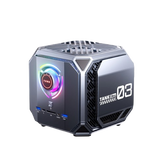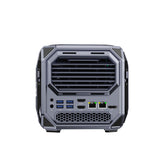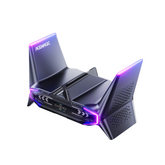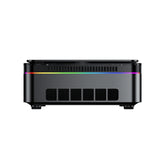Ryzen 7 Vs Ryzen 9 – Which AMD CPU Is Best For Your Needs?

Ryzen 7 vs Ryzen 9: High-Level Comparison
When comparing Ryzen 7 and Ryzen 9, the differences are more than just core counts. Ryzen 7 is targeted at high-performance mainstream users, while Ryzen 9 caters to those needing extreme multi-threading and higher raw computational power.
| Feature | Ryzen 7 | Ryzen 9 |
|---|---|---|
| Cores/Threads | 8/16 | 12–16 / 24–32 |
| Target Use | Gaming, Content Creation | Workstation, Heavy Productivity |
| Typical Power Draw | ~105W | Up to 170W |
| Pricing | Mid-range | Premium |
| Platform | AM5 / DDR5 | AM5 / DDR5 |
Ryzen 7 delivers excellent value for most tasks, while Ryzen 9 is built for serious computing demands.
Popular CPU Matchups: Ryzen 7 vs Ryzen 9
Many consumers find themselves choosing between higher-end Ryzen 7 and entry-to-mid Ryzen 9 models. While both are based on the same Zen architecture, the performance landscape differs based on cache configuration, core count, and thermal behavior.
For pure gaming tasks, Ryzen 7 often competes closely with Ryzen 9, especially in scenarios where fewer threads are utilized. However, in applications like 3D rendering, simulation, video encoding, or heavy multitasking, Ryzen 9 pulls ahead with its superior multi-thread throughput.
Architectural Differences: Zen 3 vs Zen 4 vs 3D V-Cache
Both Ryzen 7 and Ryzen 9 processors leverage AMD’s Zen 3 and Zen 4 architectures, depending on the generation.
- Zen 3: Improved IPC, unified cache, strong gaming performance.
- Zen 4: Adds DDR5 and PCIe 5.0 support, higher power efficiency, AVX-512 support.
- 3D V-Cache (available on some Ryzen 7 models): Enhances gaming performance with a large L3 cache stacked vertically, delivering significant FPS improvements in CPU-bound titles.
Zen 4-based Ryzen CPUs offer better future-proofing with modern platform features.
Core & Thread Performance
Ryzen 9 significantly outpaces Ryzen 7 in multi-threaded workloads due to its increased core and thread count.
Use cases that benefit from Ryzen 9:
- Video encoding and 3D rendering
- Large-scale photo editing or music production
- Compiling large codebases
- Running multiple virtual machines or containers
Ryzen 7, however, still handles most creator tasks well and is more than capable for occasional production or light editing workflows.
Gaming Performance: FPS and Latency Benchmarks
Gaming remains one area where Ryzen 7 holds a strong advantage in terms of value. Most modern games do not utilize more than 8 cores effectively, making Ryzen 7’s lower core count but high clock speeds and cache structure an ideal match.
In direct comparisons, gaming performance between Ryzen 7 and Ryzen 9 is often within 2–5% across most titles. This means:
- For pure gaming use, Ryzen 7 generally offers better efficiency.
- For gaming combined with heavy streaming or multitasking, Ryzen 9’s extra cores come in handy.
Productivity & Content Creation Tests
In applications like Adobe Premiere, DaVinci Resolve, Blender, and Photoshop:
- Ryzen 9 consistently produces faster render/export times.
- Ryzen 7 handles simpler or less frequent tasks efficiently but will show strain in heavier workloads.
- For professionals working under deadlines, Ryzen 9's additional cores and threads are a major advantage.
Multitasking & Streaming Capability
Ryzen 9 provides a noticeably smoother experience when running multiple applications simultaneously. Whether you're streaming and gaming, editing and encoding, or running development environments and virtual machines, Ryzen 9 maintains responsiveness with fewer slowdowns.
Ryzen 7 remains capable but may encounter higher CPU usage or require task prioritization in more demanding setups.
Thermals and Power Efficiency (TDP & Temps)
| CPU Series | Typical TDP | Cooling Needs | Efficiency |
|---|---|---|---|
| Ryzen 7 | ~105W | Air cooling sufficient | High |
| Ryzen 9 | 120W–170W | Requires AIO cooling | Moderate |
Due to its higher core density, Ryzen 9 generates more heat and demands better cooling solutions, especially under sustained workloads. Ryzen 7 runs cooler and quieter in standard use.
Motherboard Compatibility & Platform Longevity
Both Ryzen 7 and Ryzen 9 use the AM5 socket on the latest platforms, with support for:
- DDR5 memory
- PCIe 5.0 storage and graphics
- USB 4 (on some motherboards)
Platform longevity is comparable for both series, making future upgrades viable through 2026 and beyond.
Price vs Performance Analysis
| Series | Gaming Performance | Multitasking | Content Creation | Value |
|---|---|---|---|---|
| Ryzen 7 | Excellent | Good | Moderate to Good | Very High |
| Ryzen 9 | Excellent | Excellent | Excellent | Moderate to High |
Ryzen 7 provides an optimal balance for users who want great performance without overspending. Ryzen 9 is justified when your workload scales with core count.
Who Should Choose Ryzen 7?
Choose Ryzen 7 if you:
- Focus on gaming or light content creation
- Want to build a power-efficient or small form factor PC
- Prefer quiet and cool operation
- Seek high performance with great value
Who Should Choose Ryzen 9?
Choose Ryzen 9 if you:
- Regularly use video editing, rendering, or simulation software
- Need strong multitasking and streaming performance
- Run complex workflows or professional applications
- Want a workstation-class experience in a desktop system

Misconceptions About Ryzen 7 and Ryzen 9
- "Ryzen 9 is always better for gaming" – In most cases, Ryzen 7 performs equally or better due to cache optimizations and similar clock speeds.
- "More cores guarantee better performance" – Not all software scales beyond 8–12 threads.
- "Ryzen 7 is not for creators" – It handles light to moderate creative workloads efficiently.
- "Ryzen 9 requires liquid cooling only" – High-end air coolers can also manage Ryzen 9 thermals, though AIOs(All-in-One) are recommended.
FAQs: Ryzen 7 Vs Ryzen 9
Q1: Which is better for gaming?
Ryzen 7 delivers equal or better performance in most games due to optimized cache and lower latency.
Q2: Do I need Ryzen 9 for video editing?
If you edit frequently or handle 4K/8K footage, Ryzen 9 significantly reduces render times.
Q3: What kind of cooling do I need?
Ryzen 7 works well with quality air cooling. Ryzen 9 benefits from at least a 240mm AIO cooler.
Q4: Can I upgrade later from Ryzen 7 to Ryzen 9?
Yes, as long as your AM5 motherboard and power supply are compatible.
Q5: Is there a power efficiency difference?
Yes. Ryzen 7 consumes less power and produces less heat under full load.
Special Note for Mini PC Users
While this comparison focuses on desktop-class Ryzen 7 and Ryzen 9 processors, it's important to understand that mini PCs have distinct thermal and power limitations.
In most cases:
- High-TDP processors like Ryzen 9 in their desktop form (up to 170W) are not feasible in compact mini PC enclosures.
- Mini PCs typically feature mobile-class Ryzen processors such as Ryzen 7 HS or Ryzen 9 HS/U series, offering high performance within lower power envelopes (35W–54W).
- Even when desktop-class Ryzen chips are included in SFF builds, performance may be capped due to cooling and power constraints.
If you plan to use a Ryzen-powered mini PC, ensure it offers adequate thermal management and confirm the TDP level supported by the chassis.
Mini PC-Specific FAQ
Q1: Can I use a Ryzen 9 desktop CPU in a mini PC?
Most mini PCs are not designed to handle the heat and power requirements of high-TDP Ryzen 9 desktop CPUs. Instead, mobile-class Ryzen 9 processors are typically used.
Q2: Is Ryzen 7 a better fit for compact systems?
Yes. Ryzen 7 models, especially those with lower TDP, are better suited to compact systems due to their efficiency and lower thermal output.
Q3: Are there performance compromises in mini PCs?
Yes. Mini PCs often apply power limits or thermal constraints that can reduce peak performance, especially on higher-core-count CPUs.
Q4: Which Ryzen series is more power-efficient in a mini PC context?
Ryzen 7 generally offers a more balanced ratio of performance to efficiency, making it preferable for most compact systems.
Q5: Can I upgrade from Ryzen 7 to Ryzen 9 later in a mini PC?
It depends on the mini PC’s motherboard, power delivery system, and cooling design. Many mini PCs are not user-upgradable in this regard.
Final Verdict: Which AMD CPU Fits Your Workflow and Budget?
If your priorities include gaming, low noise, or balanced performance in a power-conscious setup, the Ryzen 7 series offers excellent value with minimal trade-offs.
On the other hand, if your tasks involve demanding multi-core workloads, such as professional content creation or virtualization, and you're working within a system that can properly support it, the Ryzen 9 series will deliver the additional headroom you need.
Ultimately, the right choice depends on your use case, thermal environment, and expectations—not just the core count on paper.







Leave a comment
Please note, comments need to be approved before they are published.